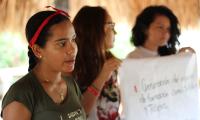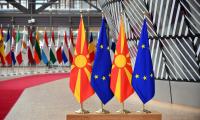In Colombia, women run in elections for what they believe in – but the stakes are high
Colombia has held its local elections, and volunteers from the Red-Green Alliance served as international election observers. The volunteers spoke with several female candidates about their motivation for running for office as well as the challenges they face as women in an unstable democratic system.

Colombia is one of South America's oldest democracies. The country, however, has a long and bloody history of internal conflict between militant groups. After years of negotiations, the government and the largest rebel group, FARC, signed a peace treaty in 2016. However, the country's democracy remains fragile, affecting women in particular.
The number of women in the Colombian parliament increased noticeably after the last parliamentary election in 2022, and women now account for approximately 30% of the total; prior to the election, the proportion was around 20%.
Women's representation and participation in Colombia's democracy are increasing. However, this is despite, rather than because of, the Colombian women's political situation. Many women are oppressed and targeted by gender-based violence in a male-dominated political culture.
Strong female candidates
Colombia held local elections on Sunday, October 29, 2023. The Red-Green Alliance sent eight volunteers to the country to serve as international election observers. They spoke with some of the women running for office about their motivation for entering politics as well as the challenges they faced as women.
The volunteers interviewed Angelica Solano Fernandes, a candidate for city council for the Esperanza Democrática party in the municipality of Fonseca. Angelica aims to increase women's visibility, as she has noticed gender disparities in the treatment of women in politics.
"It has not been easy for me to stand as a candidate. Our society is very male chauvinistic, and even though I am a Wayuu woman, a beautiful ethnicity, even though we have female inheritance and even though the woman is the bearer of life, we experience discrimination in the political space," she says and continues:
"I am competing with three men for the city council seat, and unfortunately, we women ourselves think that we have no right to political participation. The men do not support us either. I would like to work towards the equality and justice that are talked about but which we still do not experience.”
Sexual coercion as the cost of political participation
Zunilda González, a female candidate for local elections in Colombia, has also faced gender discrimination. In her political work, she has personally experienced extreme forms of sexism.
In one of her first encounters with the political world, Zunilda was subjected to sexual coercion. She describes how, earlier in her life, she had worked for a political party and campaigned for several of the candidates. After the candidates were elected, it is customary in Colombia to reward those who have supported them for their work. But it came at a high cost for Zunilda.
“I had worked politically for the party; I supported it, and several candidates were elected. Therefore, the party appointed me as the principal of a school, which is very normal. Before starting the position, I had to sleep with one of the leaders of the party. It scared me away from politics for 23 years,” Zunilda says.
Zunilda was married, and her experience affected her greatly. She lost faith in the democratic system and became acutely aware of the consequences it could have for women participating in politics.
Zunilda has returned to politics, this time as a candidate. She is, however, extremely aware of how, as a woman, she is particularly vulnerable in politics.
The political parties must be frontrunners
Women in politics face significant challenges when running for office, but there is also hope for change, and that change can come from political parties themselves.
The Red-Green Alliance met Rosita Ballesteros, who is at the top of her party's list for the Fusagasugá city council, which is part of the coalition, the Historical Pact. Her party is very supportive of her efforts to improve the status of women in politics.
“The Historical Pact has made significant investments in women for this election. For example, we have a female candidate for the post of governor; a woman is at the top of the list for the regional council; and our candidate for the post of mayor is a woman. And I am at the top of the list for the city council," Rosa says.
"We do not work to fulfil a quota; we work to ensure that women actually get a voice and are involved when decisions are made."
In October, Rosa won a seat on the city council in her municipality during the local elections.
The Red-Green Alliance works to prevent gender-based and political violence
Since 2017, the Red-Green Alliance has worked to promote democracy in Colombia. And in 2023, the Danish party formed a new partnership with the local partner, La Manada Feminista.
La Manada Feminista is a small human rights organisation made up of volunteer women who have all experienced gender-based violence and violence in political organisations.
"We work with female candidates with political positions in the states of Valle de Cauca, Cauca, and Nariño,” says La Manada Feminista. “They are being educated in our political and anti-patriarchal school, Juana Julia Guzmán, where they learn about the human rights of women and LGBTIQ+ people as well as how to deal with gender-based violence.”
"The female candidates who attend the school combine what they have learned in their political work with what they experience in their everyday lives in their various territories. They express that the process has contributed positively to their mental health, their local political work, and, above all, to their work to promote the political participation of the rest of the women and LGBTIQ+ people in their political organisations.”
The partnership between the Red-Green Alliance and La Manda Feminista must ensure that anti-patriarchal procedures are incorporated by political parties on the left so that more women like Zunilda can receive the support that is so important for women to be able and willing to participate in democracy.



